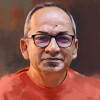Eid is here, not the smile

Eid is today, no?
You have to ask yourself just to be sure. No congregation on fields. Some people, not all, went to mosques for salat. No traditional hugging and no hand-shaking after prayers. Gathered together, yet not united. No guest is coming over and none going to visit others. Celebration is reduced to own home, spilled over to social media.
Children hadn't gone out to rooftops and made sure that they saw a slice of moon at the farthest corner in the sky. No shout, no firework, no honking of horns, and no preparation for celebration. Outside, it's quiet; eerily quiet all around. And inside, it's just another day for human zombies, swinging to the situation for the last two months in the lockdown due to coronavirus pandemic that has already claimed 480 lives at home and 3.42 lakh beyond.
Eid has a tremendous influence on our lives, economy and culture, so much so that everything would invariably revolve around the occasion. The three shots from two Eids and Pahela Baishakh keep the domestic businesses going for a whole year. Sadly, it's on a sickbed, missing out on two back-to-back shots from Pahela Baishakh and this Eid. Businesses are ailing, so are we. Eid is here, yet a sense of huge emptiness engulfs each of us. Happiness, where has it gone?
Have we seen happy faces, this time? Ahead of every Eid, the faces that make a beeline for homes, finding a place for oneself on any vehicle that moves, braving any situation that reminds of hell and savouring every sight on the way.
Caught in a 50km long tailback, they smile. Made to walk for 10kms while going out of Dhaka, they smile. Kept in wait at ferry terminals for 18 hours, they smile. Ended up in truck after finding no bus ticket, they smile. Forking out on last-minute shopping with whatever left from festival bonus, they smile. Cheated out by touts, they smile. They keep this smile all the way to their homes, places of their birth. Smile stays with them throughout the days they stay there before heading back to cities, the places of their work. Every person they meet and everything they see -- the tiny teashop, tree-shaded roads, rickshaws, sweet shop, flying birds over vast paddy field, still pond or the elderly barber from childhood. Smile, where has it gone this time?
The call from home ahead of Eid is in their genes. Though not that huge, the famous home-rush was also there this time around. The journey was made far more arduous, with public transports staying off roads. This time, they were made to walk longer. This time, they were made to suffer more, with ferry services being snapped by authorities. This time, they were told not to go home. This time, the journey was dubbed infamous. And, this time, they didn't smile. Dark clouds of nor'easter gathered on their faces, making them look worried about what lies in the future.
Dhakaites eagerly wait for the chand raat, the eve of Eid day, to go out for last minute shopping and late night adda in a deserted capital after the gypsies go back to their roots. Chand raat had come and gone, but only a few people went out, not with smile but worry. Shopping for Eid was not seen well by the most.
Such is the strangest time when comes this Eid, an occasion for happiness for all Muslims -- rich and poor -- for centuries. Eid this year has turned out to be the eeriest one in living memory. Happiness is sucked out of our souls by an army of tiny virus.
Smile is what we're missing. Not sure, for how long.

 For all latest news, follow The Daily Star's Google News channel.
For all latest news, follow The Daily Star's Google News channel. 




Comments